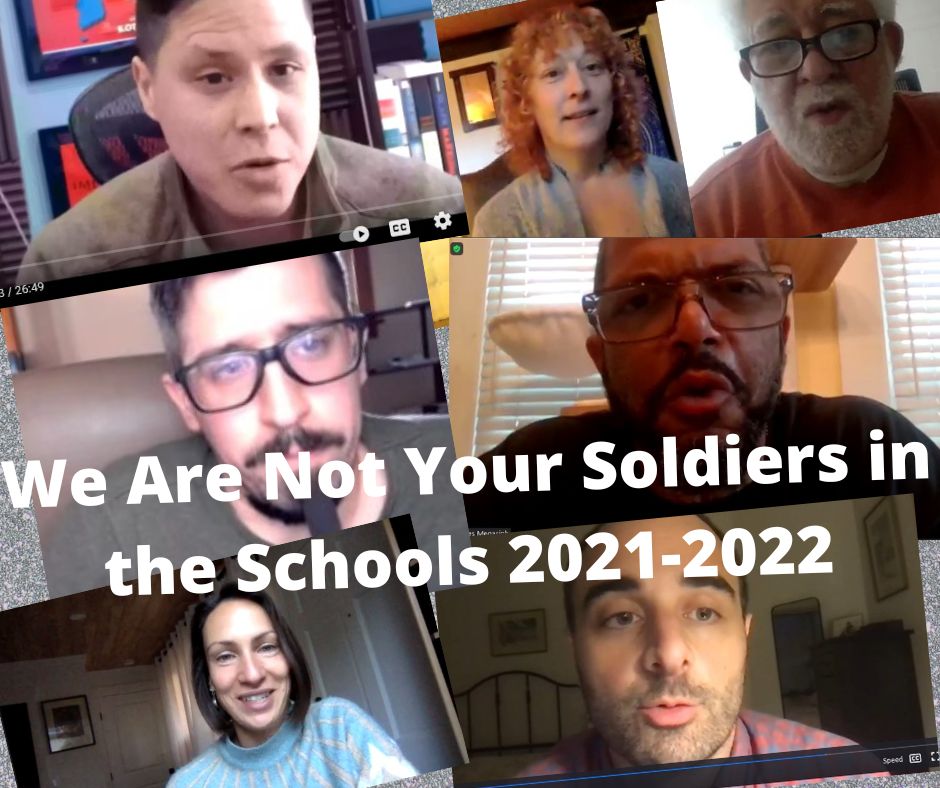
Thanks to you, our supporters, we have had another productive year, without charging any fee to any school! Seven veterans engaged in discussion with some 1000 students, presenting their stories filled with information about the U.S. military and wars of aggression most students had never been exposed to before. Thank you for helping make it happen!
As the year went on, more wars, more tragedy, more chaos – we continued to visit schools, still all remotely. In most cases, students were back in their classrooms. Some classes continued solely on-line while a few had hybrid modalities. While the majority of schools we visited were in New York City or within New York State, we also “traveled” to the states of Pennsylvania, North Carolina, Washington and Oregon. We have mastered remote technology, making it very easy to go anywhere we receive a request and permitting our speakers, who are located around the country, to engage in visits without extensive travel and extended time off from work, school and family. On the other hand, we miss the opportunities to engage in more one-on-one discussions which often occur when we spend the day in a building. We also were invited to be interviewed on a radio show, for Memorial Day, hosted by a former NYC teacher whose classes we had visited over several years.
It was not easy for educators or students to return to their buildings after more than a year away. There was a lot of transitioning to be worked through, including for those who opted to remain totally or partially on-line. Consequently, we made 8 school visits during the fall semester and 16 in the spring bringing us to a total of 24 school visits – some were repeated visits to the same school. We made 11 college and 12 high school visits and, in the late spring, one middle school visit. While at these schools, we made presentations to 50 classes.
It is also not easy for the seven veterans who entered into open discussions with the students to talk about issues around which most veterans remain silent. As Miles explained in one class, “If your moral compass is broken, it’s hard to navigate through life. There’s shame and pain so most veterans stay silent. You feel responsible for all these things that go wrong and feel there’s nothing you can do about them.” And, as Joy pointed out, “You have to re-person yourself because the military trains you to feel like a thing.” Almost all the comments we receive from students – whether on evaluation forms, thank you notes or essays – remark on how open and honest the presenters are. For one example, a college student wrote, “I found Rosa’s story to be honest, raw, and insightful. Many people do not speak of the truth of the military and go through it as is, but Rosa was honest and vulnerable to how she felt when she joined at the age of seventeen.” Or this note to Miles, “Thank you so much for sharing and turning an uncomfortable traumatic event into an inspiring lesson.”
We’re grateful we’re able to post excerpts from three presentations which were recorded on Zoom.
Watch Joy Damiani, an Army veteran who had been stationed in Iraq as a “journalist,” sharing her story and answering questions from students at a NYC middle school in the spring. This is one of only a very few instances of a presentation to this age group. These students had done a lot of studying over the year and were well-prepared, as you will see from this video.
Watch Will Griffin, Army veteran, who had tours in both Iraq and Afghanistan, share his story and a special not-to-be-missed slide show filled with historical and current background information as he presents to a class in an alternative high school in NYC.
Watch Lyle Rubin, Marine veteran who was stationed in Afghanistan. This short video contains excerpts of Lyle’s talk with a college ethics class in NYC where he concentrates on depersonalization and dehumanization in Boot Camp and transformational issues.
